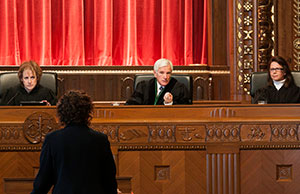Supreme Court Asked to Decide If Company-Paid Employee Benefits Are Countable as ‘Income’ In Calculating Child Support Obligation
Among Four Cases Scheduled for Argument on June 11

The Chief Justice and Justices of the Ohio Supreme Court will hear arguments in eight cases June 4 and 5.

The Chief Justice and Justices of the Ohio Supreme Court will hear arguments in four cases June 11.
The Supreme Court of Ohio will hear oral argument next week in a case that asks whether a Medina County court acted contrary to law when it included the value of a divorced father’s company car and other employer-paid job benefits in calculating his “gross income” for child support purposes.
The court’s Office of Public Information today released summaries of that case and three others that will be heard by the justices on Tuesday June 11.
In Morrow v. Becker, divorced father Jeffrey Morrow sought a reduction in his monthly child support obligation based on a decrease in his salary. In determining that Morrow’s current gross income did not entitle him to the requested adjustment, the Medina County Domestic Relations Court included in its calculations $16,756 in annual non-cash job benefits Morrow received from his employer including the use of a company-paid car and cell phone, insurance, and tickets to OSU football games. On review, the Ninth District Court of Appeals affirmed the inclusion of Morrow’s company-paid benefits in his gross income under a “catch-all” provision of the state child support statute that allows a court to count compensation received by a parent from “all other sources of income.”
Morrow’s attorneys argue that the trial and appellate courts disregarded language in the child support statute that specifically addresses employment benefits such as the use of a company-paid car. They assert that the statute authorizes the inclusion of employer-paid benefits in a parent’s gross income only when the person receiving the benefit is self-employed or is the proprietor, owner, or co-owner of the business entity providing the benefit.
The other cases to be argued on June 11 include:
- Riscatti v. Prime Properties Ltd. Partnership, in which the court is asked to decide whether a provision of the state’s political subdivision immunity statute allows a political subdivision to immediately appeal a trial court ruling that denies a motion by the subdivision to dismiss a plaintiffs’ lawsuit on the basis that it wasn’t filed within the statutory two-year time limit after the plaintiff became aware that he or she had an actionable claim against the subdivision.
- In State v. Long, a 17-year-old who was tried as an adult for the aggravated murders of two persons and sentenced to life in prison with no possibility of parole asks the court to set aside his sentence as cruel and unusual punishment. His attorneys argue that the trial court failed to follow the requirements of the U.S. Supreme Court’s 2012 holding in Miller v. Alabama by explicitly acknowledging in its sentencing entry the young age of the defendant and addressing the presumptions that a minor who commits a crime has a lower level of culpability and is more amendable to rehabilitation than an adult who commits a similar offense.
- State v. Wesson is a death penalty case in which the defendant argues that technical defects in his indictment and procedural errors during his trial require that his convictions for the aggravated murder of an 81-year-old Akron man must be set aside, and that his death sentence must be vacated based on the state’s failure to obtain a valid conviction for a capital offense.


